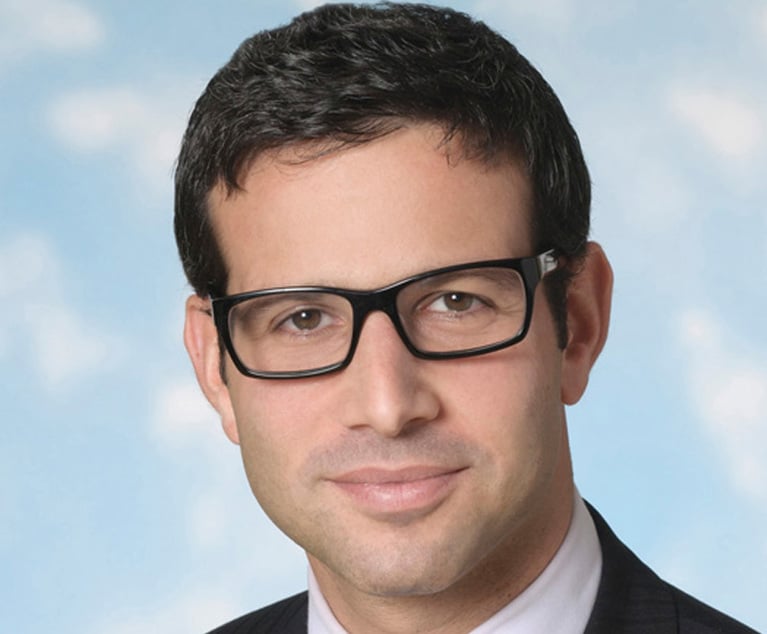 McKool Smith partner Douglas Cawley
McKool Smith partner Douglas CawleyLifetime Achievement: Douglas A. Cawley, McKool Smith
Douglas Cawley practices intellectual property litigation and is a member of American College of Trial Lawyers; AIPLA; American, Federal Circuit, and Dallas Bar Associations.
August 31, 2018 at 06:00 AM
3 minute read
Douglas Cawley practices intellectual property litigation and is a member of American College of Trial Lawyers; AIPLA; American, Federal Circuit, and Dallas Bar Associations. Over the past eight years, Cawley has secured more than $1 billion in patent infringement verdicts, including a $173M verdict for ParkerVision against Qualcomm; $368M verdict for VirnetX Holding Corp. against Apple; $200M verdict for i4i against Microsoft; $106M verdict for VirnetX against Microsoft; $21M verdict for Anascape Ltd. against Nintendo; and a $156M verdict for TGIP Inc. Cawley graduated from the University of Texas School of Law with honors, and the University of Texas with high honors.
The legal profession is constantly evolving and that evolution only seems to have accelerated in recent years. What's the biggest change you've seen in your profession during your career?
The emergence of female lawyers. When I began practicing only a small fraction of lawyers were women, and even fewer went to court. Today it's typical that at least half of the lawyers working on a case are women. I'm not wise enough to understand all the ways in which this has changed the profession, but it's the biggest—and I think most profound—change I've seen.
What is one thing about the profession that has remained unchanged over the years?
That collegiality is good for everybody: our clients; our adversaries; our courts; and the legal system. When I look around at lawyers who have been successfully trying cases for 45 years plus, they are usually the ones who have figured out how to be hard on the issues but easy on the people.
What is one piece of advice you would give someone entering into the profession that you wish you had as a young lawyer?
When I entered the profession it was all the rage to approach the practice of law as a business. Of course, that's important. But many of us lost sight of the fact that running a successful business is not a lawyer's most important role. Our most important role is serving our clients. If you're able to look back on your career with satisfaction it's probably not because of the big fees you brought in, but because of the people whose lives you affected in a positive way by your counsel, judgment, and advocacy.
This content has been archived. It is available through our partners, LexisNexis® and Bloomberg Law.
To view this content, please continue to their sites.
Not a Lexis Subscriber?
Subscribe Now
Not a Bloomberg Law Subscriber?
Subscribe Now
NOT FOR REPRINT
© 2025 ALM Global, LLC, All Rights Reserved. Request academic re-use from www.copyright.com. All other uses, submit a request to [email protected]. For more information visit Asset & Logo Licensing.
You Might Like
View All
Kirkland's Daniel Lavon-Krein: Staying Ahead of Private Equity Consolidation

Vinson & Elkins: Traditional Energy Practice Meets Energy Transition
4 minute read
Advising 'Capital-Intensive Spaces' Fuels Corporate Practice Growth For Haynes and Boone
4 minute read
Get to Know Texas Lawyer's Attorney of the Year Finalists
Trending Stories
- 1People in the News—Jan. 2, 2025—Eastburn and Gray, Klehr Harrison
- 2Deal Watch: Latham, Paul Weiss, Debevoise Land on Year-End Big Deals. Plus, Mixed Messages for 2025 M&A
- 3Bathroom Recording Leads to Lawyer's Disbarment: Disciplinary Roundup
- 4Conn. Supreme Court: Workers' Comp Insurance Cancellations Must Be Unambiguous
- 5To Avoid Conflict, NYAG Hands Probe Into Inmate's Beating Death to Syracuse-Area DA
Who Got The Work
Michael G. Bongiorno, Andrew Scott Dulberg and Elizabeth E. Driscoll from Wilmer Cutler Pickering Hale and Dorr have stepped in to represent Symbotic Inc., an A.I.-enabled technology platform that focuses on increasing supply chain efficiency, and other defendants in a pending shareholder derivative lawsuit. The case, filed Oct. 2 in Massachusetts District Court by the Brown Law Firm on behalf of Stephen Austen, accuses certain officers and directors of misleading investors in regard to Symbotic's potential for margin growth by failing to disclose that the company was not equipped to timely deploy its systems or manage expenses through project delays. The case, assigned to U.S. District Judge Nathaniel M. Gorton, is 1:24-cv-12522, Austen v. Cohen et al.
Who Got The Work
Edmund Polubinski and Marie Killmond of Davis Polk & Wardwell have entered appearances for data platform software development company MongoDB and other defendants in a pending shareholder derivative lawsuit. The action, filed Oct. 7 in New York Southern District Court by the Brown Law Firm, accuses the company's directors and/or officers of falsely expressing confidence in the company’s restructuring of its sales incentive plan and downplaying the severity of decreases in its upfront commitments. The case is 1:24-cv-07594, Roy v. Ittycheria et al.
Who Got The Work
Amy O. Bruchs and Kurt F. Ellison of Michael Best & Friedrich have entered appearances for Epic Systems Corp. in a pending employment discrimination lawsuit. The suit was filed Sept. 7 in Wisconsin Western District Court by Levine Eisberner LLC and Siri & Glimstad on behalf of a project manager who claims that he was wrongfully terminated after applying for a religious exemption to the defendant's COVID-19 vaccine mandate. The case, assigned to U.S. Magistrate Judge Anita Marie Boor, is 3:24-cv-00630, Secker, Nathan v. Epic Systems Corporation.
Who Got The Work
David X. Sullivan, Thomas J. Finn and Gregory A. Hall from McCarter & English have entered appearances for Sunrun Installation Services in a pending civil rights lawsuit. The complaint was filed Sept. 4 in Connecticut District Court by attorney Robert M. Berke on behalf of former employee George Edward Steins, who was arrested and charged with employing an unregistered home improvement salesperson. The complaint alleges that had Sunrun informed the Connecticut Department of Consumer Protection that the plaintiff's employment had ended in 2017 and that he no longer held Sunrun's home improvement contractor license, he would not have been hit with charges, which were dismissed in May 2024. The case, assigned to U.S. District Judge Jeffrey A. Meyer, is 3:24-cv-01423, Steins v. Sunrun, Inc. et al.
Who Got The Work
Greenberg Traurig shareholder Joshua L. Raskin has entered an appearance for boohoo.com UK Ltd. in a pending patent infringement lawsuit. The suit, filed Sept. 3 in Texas Eastern District Court by Rozier Hardt McDonough on behalf of Alto Dynamics, asserts five patents related to an online shopping platform. The case, assigned to U.S. District Judge Rodney Gilstrap, is 2:24-cv-00719, Alto Dynamics, LLC v. boohoo.com UK Limited.
Featured Firms
Law Offices of Gary Martin Hays & Associates, P.C.
(470) 294-1674
Law Offices of Mark E. Salomone
(857) 444-6468
Smith & Hassler
(713) 739-1250






